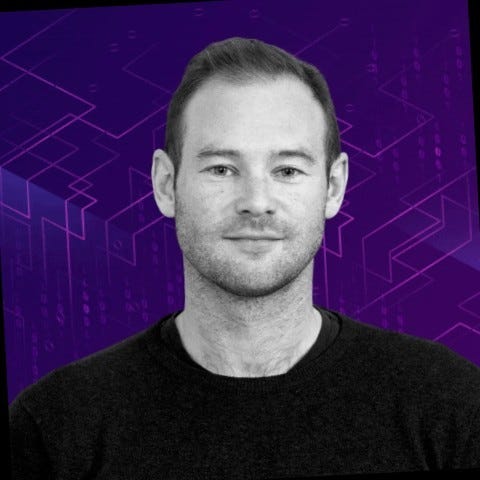⚡👩🏾💻 Blockchain, Climate and Kelp with Craig Wilson
PLUS: Checkerspot has closed a $55 Million Series C, and GC Rieber VivoMega has launched a line of VivoMega Algae Oils.
“It's been eye-opening to see how much impact we can have just by telling farmers that we're going to buy what they grow. It takes away so much stress and uncertainty." — Craig Wilson, The Crop Project + Climate Collective
Dear algae technologists - hello and welcome to the Paxtier Report!
This week, here’s a little highlight from my recent call with Climate Collective’s Craig Wilson:

In today’s report:
Markets: 💸 Spira Inc. announces start of fundraise to expand sustainable alternative to artificial colours.
Deals: 🤝 Checkerspot has closed a $55 Million Series C.
Movers and Shakers: 🌱 Blockchain, Climate and Kelp with Craig Wilson.
Around the web: 🌍 UTS has developed a potential alternative to single-use plastics...
Markets and Investing
✂️Algae Market Snippets
Some big moves in recent weeks:
Purdue receives $10M aquaponics grant. (Read more HERE).
Neste considers establishing an algae pilot facility in Spain. (Read more HERE).
Russia's largest salmon producer acquires algae production company in drive to diversify. (Read more HERE).
Loliware has raised $15.4M in pre-Series A. (Read more HERE).
Ping An P&C launches first ocean carbon sink index insurance policy for marine ecosystem. (Read more HERE).
GC Rieber VivoMega has launched a line of VivoMega Algae Oils, which are ocean-derived, high-concentration vegan omega-3 oils sourced from microalgae. (Read more HERE).
Funding boost to help UK producers tackle harmful algal blooms. (Read more HERE).
The U.S. Department of Energy announced another $25.5M in funding to biofuels and bioproducts. (Read more HERE).
Petronas Research (PRSB) and SEDC Energy have signed an agreement to develop technology for microalgae oil production. (Read more HERE).
Algarithm Ingredients and Thai Union announced the successful close of a multi-year manufacturing partnership (Read more HERE).
Amazon grants €1.5M to Dutch seaweed farm project. (Read more HERE).
Ocean Rainforest raises $6.2M (approximately €5.8M) - led by The Grantham Foundation. (Read more HERE).
The Asian Development Bank has agreed to provide an equity investment of up to $15M to Vietnam-based Australis to finance its climate-smart barramundi and seaweed aquaculture project. (Read more HERE).
TECA has selected seven startups to each receive US$55,000 in funding. This includes Mwani Blu, which is building a seaweed marketplace with high-level traceability. (Read more HERE).
Korean biotechnology start-up Seawith recently signed a new partnership to accelerate cultivated meat production with Esco Aster. (Read more HERE).
NaturalShrimp, Inc. announced the beginning of a prawn farm wastewater trial in Mackay, Australia. (Read more HERE).
Czech-based Mewery has introduced a prototype of microalgae-based cultivated meat, combining 75 percent pork cells and 25 percent microalgae cells. (Read more HERE).
Prometheus Materials has been awarded ASTM C129 certification for non-loadbearing concrete masonry units (CMU) and ASTM C90 for loadbearing CMUs for its bio-cement product. (Read more HERE).
Checkerspot has closed a $55 Million Series C. (Read more HERE).
A global initiative has been launched to restore 1 million hectares of kelp forests by 2040. (Read more HERE).
Spira Inc. announces start of fundraise to expand sustainable alternative to artificial colours. (Read more HERE).
Arctic Bioscience has acquired Arctic Algae AS for NOK 16,3 million (1.6 million USD). The move will help bolster Arctic Bioscience's portfolio of pharmaceutical and nutraceutical products based on unique bioactive marine compounds. (Read more HERE).
Neptune Elements acquires Arvorig Solutions. (Read more HERE).
Royal Greenland has been awarded 5,5 million DKK ($784,826) to support further seaweed project development. (Read more HERE).
In depth with Peter Green
🌍 Blockchain, Climate and Kelp with Craig Wilson
Craig Wilson is a climate angel investor and Managing Director at NYU Tandon Future Labs.
As the Founding CEO of Climate Collective and co-founder of The Crop Project, a regenerative agricultural processing company focused on kelp, Craig is intimately familiar with the difficulties facing early-stage tech and climate enterprises.
In this snippet from our recent discussion, Craig shares his insights on seaweed supply chains in the US, grant funding, and building in climate. Hope you enjoy!
How did you get started in climate?
I studied at Middlebury College in Vermont, a well-known institution for environmental studies, where I was surrounded by experts such as Bill McKibben, co-founder of 350.org. While at Middlebury, I became interested in climate issues, but decided to shift to tech after the green tech bubble burst. I then worked as a professional ski patroller in Washington State before becoming the Chief of Staff for a family office in Sydney, Australia.
After returning to New York, I co-founded an economic database company, now known as Syntax, before going to business school at NYU. During my time there, I worked with mission-driven and seed investment funds like Collaborative Fund and Founder Collective. I also managed several NYU incubators promoting entrepreneurship and technology.
A few years ago, I co-founded The Crop Project, a seaweed processing company, and later joined Climate Collective to lead the digitisation of voluntary carbon markets and explore web3 technology for climate action. Now on paternity leave, I continue to support climate solutions and companies as an angel investor.
Can you expand on Climate Collective and The Crop Project?
Climate Collective is a coalition of investors, non-profits, entrepreneurs, and scientists utilising sustainable digital infrastructure to enable verifiable climate action at scale. The organisation aims to create a trusted market for high-quality, digital environmental assets that support the planet's well-being.
The company also provides grants to projects that are at the forefront of scientific innovation in the climate space. We recognise that grant capital is often underutilised in the sector, and that it provides opportunities to experiment and prove out concepts before seeking institutional capital, which can come with expectations and deadlines.
The organisation is supported by Celo, a mobile-first layer one chain in the crypto world that aims to make regenerative finance accessible to everyone. By being mobile-first, Celo is more inclusive of the Global South, thereby addressing the accessibility issues that have hindered the promises of crypto.
The Crop Project is an agricultural processing and wholesale company bringing regenerative crops to market, starting with Atlantic Sugar Kelp. The company strives to empower small farms and distribute profits more equitably across the supply chain. We are building regional infrastructure to support small farms with processing and commercialisation, as well as bridging the gap between farmers, market players, and regulators.
It's been eye-opening to see how much impact we can have just by telling farmers that we're going to buy what they grow. It takes away so much stress and uncertainty for them. Supporting small and medium-sized farmers, who drive innovation and underpin coastal communities and economies, is especially important. They already have so much on their plate with crop planning and seed quality control. The onus shouldn't be on farmers to reach out to potential buyers.
Do you see blockchain and seaweed converging in the future?
Blockchain and seaweed could converge in the future, but there are significant challenges in both sectors that need to be addressed first.
Regarding blockchain, the accessibility of platforms remains a significant issue, and there's a lack of regulatory guidelines - which creates uncertainty for those working on climate blockchain projects. We also need more environmental experts at the intersection of climate and crypto.
When it comes to seaweed, establishing domestic supply chains for emerging seaweed nations is crucial for the development of local, regional, and national seaweed industries. To achieve this, incentivising small and medium-sized farmers to grow more seaweed is essential. Building out the supply side, not creating demand, is the real challenge in these nations.
Where would you invest if you were tasked with scaling the sector in the US?
Acquiring coastal leases and supporting efficient cultivation is a top priority. By assisting farmers with bureaucratic hurdles and providing necessary resources, they can completely focus on growing their crops.
In addition, I would use project finance to support the development of biorefineries that can process seaweed into various products.
What advice would you give to someone else starting out on this journey?
Focus on grant funding before pursuing institutional capital. It's best to find someone with expertise in grant writing to assist with applications. Talking to program officers can also provide insight into what they're seeking.
Secondly, don’t be too hard on yourself. Everyone is learning as they go, and what distinguishes successful entrepreneurs from the rest is their commitment to learning and absorbing knowledge. Reading scientific papers voraciously and conducting small experiments will pave the way for scaling.
If you’d like to learn more about Craig or join him in his mission, check out his LinkedIn here.
🐦Tweet of the week
🔥 What else was hot in algae tech?
(Paper) Pelagic calcium carbonate production and shallow dissolution in the North Pacific Ocean (Read more HERE).
"Bio-based products are increasingly profitable.” Fantastic look at bio-based products by Yale 360...(Read more HERE).
UTS has developed a potential alternative to single-use plastic... now they look at the final steps towards ensuring its market-readiness and sustainability. (Read more HERE).
ZIVO Bioscience’s novel immune-modulating biologic for treating coccidiosis in broiler chickens produced questionable results due to a high disease burden among tested chickens. (Read more HERE).
Project Madoc is a feasibility study exploring cultivated seaweed in Wales. Here’s a survey asking experts for advice on the subject. (Read more HERE).
Alex Hristov, Penn State distinguished professor of dairy nutrition, has received a $2 million grant. As part of the funding, the USDA wants Penn State to continue evaluating seaweed's potential in long-term trials. (HERE).
(Paper) Genome-wide signatures of adaptation to extreme environments in red algae. (Read more HERE).
First virtual Seagriculture Asia-Pacific hailed as a success. (Read more HERE).
Australia’s plastic alternative firm Uluu aims to build commercial plant in 2025. (Read more HERE).
(Paper) Biomaterial-based platforms for tumour tissue engineering. (Read more HERE).
SITE Algae is the producer of meal replacement FOOD bars containing microalgae. The company is producing FOOD bars to reach communities in Turkey and Syria affected by the recent earthquakes. (Read more HERE).
Jobs
Vyld - Chief Technology Officer (CTO)
That’s all folks!
Thanks again for joining us this week. Hope you have a great day and stay tuned for more algae tech updates soon!
Peter






